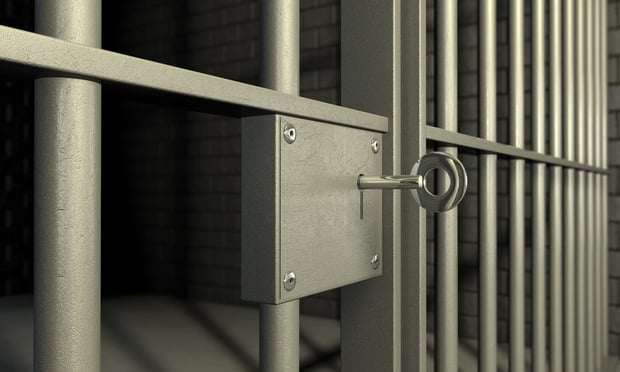Criminal Justice Reform Law a Good Start
Although far from perfect, these reforms are extremely important for persons convicted of federal crimes, their families, and federal criminal law practitioners.
January 21, 2019 at 10:00 AM
2 minute read

President Trump signed this multi-year, bipartisan federal criminal justice legislation on Dec. 21, 2018. Congress has finally begun to follow the lead of some states in coming to grips with the huge fiscal and human costs associated with mass incarceration and difficult reentry into society for those convicted of crimes. The act contains many compromises and is not seen by anyone as perfect or eliminating the need for further reform.
The act requires that a federal prisoner, subject to availability and security matters, be placed in a federal prison “as close as practicable to the prisoner's primary residence.“ This is an important response to the problem of family separation, which interferes with rehabilitation. The law also liberalizes the opportunity for low-risk inmates to serve a portion of their sentence through home confinement; expands eligibility for elderly offender home detention and compassionate release; requires the Bureau of Prisons to assist in obtaining the proper forms of identification prior to release; requires the bureau to expand its treatment of opioid and heroin addiction; requires a wide range of new types of information to be provided by the bureau; requires the bureau to provide female inmates with sanitary products free of charge; restricts the use of solitary confinement for juveniles; provides funding for reentry programs at the state level; restricts enhanced sentencing and mandatory minimum sentences for prior drug felonies (not retroactive); liberalizes the three-strikes law; makes retroactive the 2010 elimination of the disparity between crack-cocaine and powder-cocaine; restricts the use of restraints on pregnant inmates; requires the development of a “recidivism risk” assessment of each inmate and provides incentives for their participation in recidivism-reduction programs; and provides, at least for some prisoners, the possibility of receiving “time credits“ that lead to earlier pre-release custody.
There are a number of other provisions in this new law, as well as authorization for substantial funding for its implementation. Although far from perfect, these reforms are extremely important for persons convicted of federal crimes, their families, and federal criminal law practitioners. We look forward to the successful implementation of these reforms as well as additional improvements that may attract bipartisan agreement.
This content has been archived. It is available through our partners, LexisNexis® and Bloomberg Law.
To view this content, please continue to their sites.
Not a Lexis Subscriber?
Subscribe Now
Not a Bloomberg Law Subscriber?
Subscribe Now
NOT FOR REPRINT
© 2025 ALM Global, LLC, All Rights Reserved. Request academic re-use from www.copyright.com. All other uses, submit a request to [email protected]. For more information visit Asset & Logo Licensing.
You Might Like
View All

'You Became a Corrupt Politician': Judge Gives Prison Time to Former Sen. Robert Menendez for Corruption Conviction
5 minute read
Federal Judge Pauses Trump Funding Freeze as Democratic AGs Plan Suit
4 minute readTrending Stories
Who Got The Work
J. Brugh Lower of Gibbons has entered an appearance for industrial equipment supplier Devco Corporation in a pending trademark infringement lawsuit. The suit, accusing the defendant of selling knock-off Graco products, was filed Dec. 18 in New Jersey District Court by Rivkin Radler on behalf of Graco Inc. and Graco Minnesota. The case, assigned to U.S. District Judge Zahid N. Quraishi, is 3:24-cv-11294, Graco Inc. et al v. Devco Corporation.
Who Got The Work
Rebecca Maller-Stein and Kent A. Yalowitz of Arnold & Porter Kaye Scholer have entered their appearances for Hanaco Venture Capital and its executives, Lior Prosor and David Frankel, in a pending securities lawsuit. The action, filed on Dec. 24 in New York Southern District Court by Zell, Aron & Co. on behalf of Goldeneye Advisors, accuses the defendants of negligently and fraudulently managing the plaintiff's $1 million investment. The case, assigned to U.S. District Judge Vernon S. Broderick, is 1:24-cv-09918, Goldeneye Advisors, LLC v. Hanaco Venture Capital, Ltd. et al.
Who Got The Work
Attorneys from A&O Shearman has stepped in as defense counsel for Toronto-Dominion Bank and other defendants in a pending securities class action. The suit, filed Dec. 11 in New York Southern District Court by Bleichmar Fonti & Auld, accuses the defendants of concealing the bank's 'pervasive' deficiencies in regards to its compliance with the Bank Secrecy Act and the quality of its anti-money laundering controls. The case, assigned to U.S. District Judge Arun Subramanian, is 1:24-cv-09445, Gonzalez v. The Toronto-Dominion Bank et al.
Who Got The Work
Crown Castle International, a Pennsylvania company providing shared communications infrastructure, has turned to Luke D. Wolf of Gordon Rees Scully Mansukhani to fend off a pending breach-of-contract lawsuit. The court action, filed Nov. 25 in Michigan Eastern District Court by Hooper Hathaway PC on behalf of The Town Residences LLC, accuses Crown Castle of failing to transfer approximately $30,000 in utility payments from T-Mobile in breach of a roof-top lease and assignment agreement. The case, assigned to U.S. District Judge Susan K. Declercq, is 2:24-cv-13131, The Town Residences LLC v. T-Mobile US, Inc. et al.
Who Got The Work
Wilfred P. Coronato and Daniel M. Schwartz of McCarter & English have stepped in as defense counsel to Electrolux Home Products Inc. in a pending product liability lawsuit. The court action, filed Nov. 26 in New York Eastern District Court by Poulos Lopiccolo PC and Nagel Rice LLP on behalf of David Stern, alleges that the defendant's refrigerators’ drawers and shelving repeatedly break and fall apart within months after purchase. The case, assigned to U.S. District Judge Joan M. Azrack, is 2:24-cv-08204, Stern v. Electrolux Home Products, Inc.
Featured Firms
Law Offices of Gary Martin Hays & Associates, P.C.
(470) 294-1674
Law Offices of Mark E. Salomone
(857) 444-6468
Smith & Hassler
(713) 739-1250







